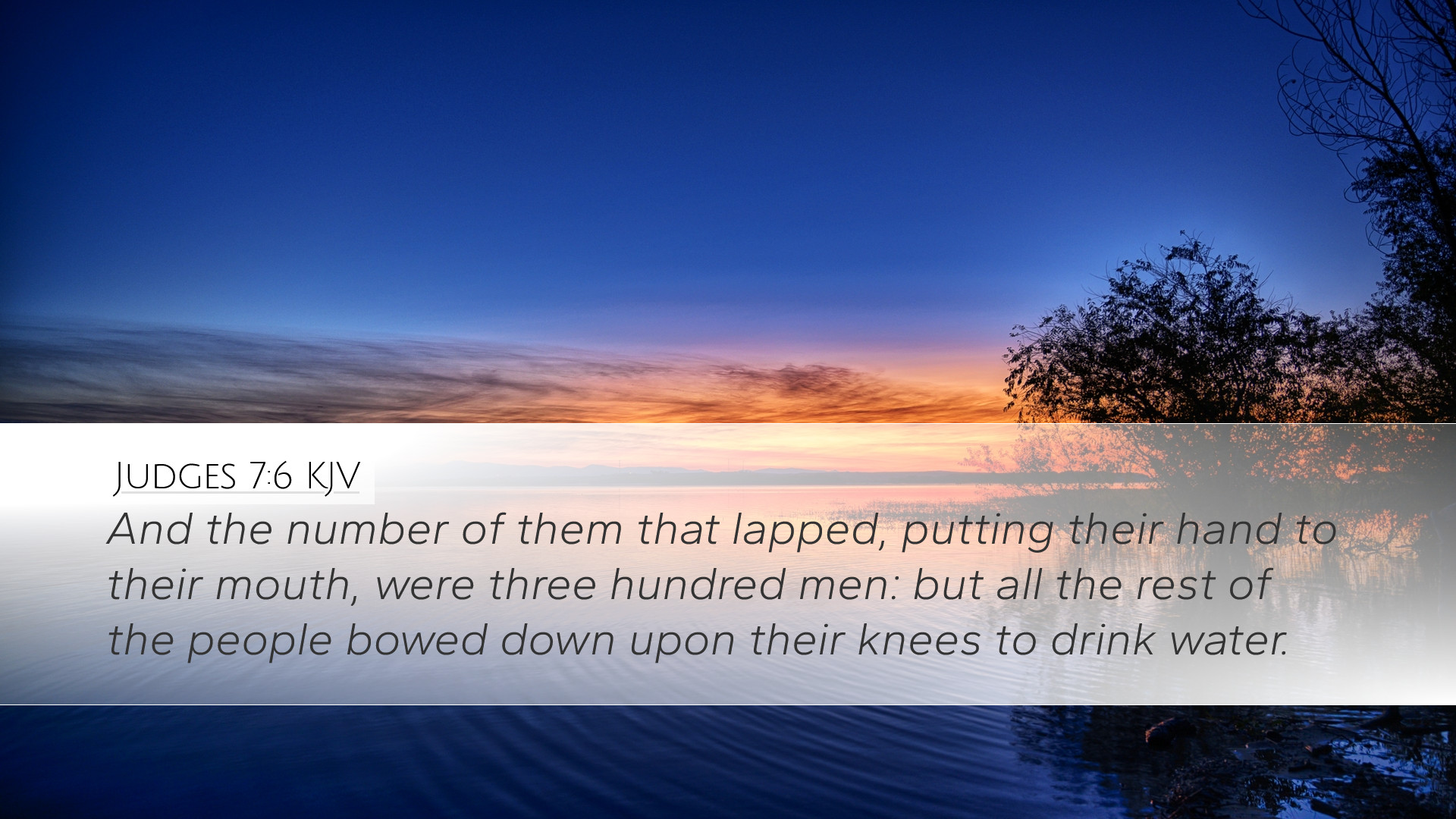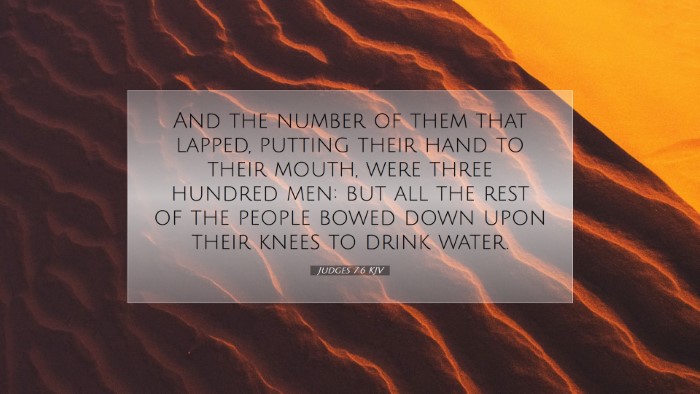Old Testament
Genesis Exodus Leviticus Numbers Deuteronomy Joshua Judges Ruth 1 Samuel 2 Samuel 1 Kings 2 Kings 1 Chronicles 2 Chronicles Ezra Nehemiah Esther Job Psalms Proverbs Ecclesiastes Song of Solomon Isaiah Jeremiah Lamentations Ezekiel Daniel Hosea Joel Amos Obadiah Jonah Micah Nahum Habakkuk Zephaniah Haggai Zechariah MalachiJudges 7:6
Judges 7:6 KJV
And the number of them that lapped, putting their hand to their mouth, were three hundred men: but all the rest of the people bowed down upon their knees to drink water.
Judges 7:6 Bible Commentary
Commentary on Judges 7:6
Judges 7:6 states:
"And the number of those who lapped, putting their hand to their mouth, was three hundred men; but all the rest of the people bowed down on their knees to drink water."
This verse occurs in the context of Gideon's preparation to confront the Midianites, emphasizing God's selective process in choosing leaders and warriors.
Contextual Background
The narrative in Judges chapters 6-7 describes Israel's oppression by Midian and God's calling of Gideon as a leader. Gideon's initial hesitance is met with reassurances from God, leading to the gathering of an army to challenge their oppressors. However, God trims this army down significantly, which sets the stage for a mighty demonstration of divine intervention.
Exegesis of Judges 7:6
Matthew Henry offers a notable perspective on this verse:
Matthew Henry: "God's ways are often contrary to those of men; He chooses the weak and the few to confound the mighty. The selection of the 300 who lapped water demonstrates that God desires those who possess not just physical strength, but discernment and readiness for battle."
This commentary reflects Henry’s emphasis on God's criteria, which often appears counterintuitive to human reasoning. The act of lapping water indicates a vigilant posture, suggesting readiness to engage in battle while remaining alert to dangers.
Analysis of the Selection Process
Albert Barnes gives further insights into the implications of the selection process:
Albert Barnes: "The lapping of the water with their hands indicates those who kept their eye upon the enemy, taking only what was necessary to sustain themselves. Thus, God used this act to filter out those truly prepared for His purpose."
Barnes’ comments hint at the spiritual discernment necessary for effective leadership and participation in God's plans. Each soldier’s behavior revealed their level of alertness and commitment.
Theological Implications
The choice to pare down the Israelite forces to a mere 300 men brings forth profound theological implications:
- Divine Sovereignty: God's control over the situation illustrates His sovereignty over Israel's battles.
- Human Dependence: It embodies the notion that success in our endeavors comes not from our numbers or strength but from reliance on God.
- Preparation for Worship: As these men reflect readiness, it echoes the call for believers to be prepared, spiritually alert, and devoted to their calling.
Practical Application for Today's Believers
Adam Clarke notes:
Adam Clarke: "The number was small, yet they succeeded in a great victory. This serves as a reminder that God is able to deliver through the few as through the many."
This is an important lesson for contemporary believers. The emphasis is not on overwhelming might but on faith and God's ability to work through seemingly inadequate means. In various church contexts, whether in evangelism, missions, or local ministry efforts, each believer is called to rely on God's strength rather than human capability.
Conclusion
Judges 7:6 serves as a compelling narrative on the nature of God’s selection and preparation of His instruments. The lesson drawn from Gideon’s army is not just historical but is rich with spiritual application for pastors, students, and theologians today. As they seek to fulfill their roles in God's kingdom, they must remember that faithfulness, alertness, and reliance on the Almighty are essential for victory, regardless of the challenges they face.


